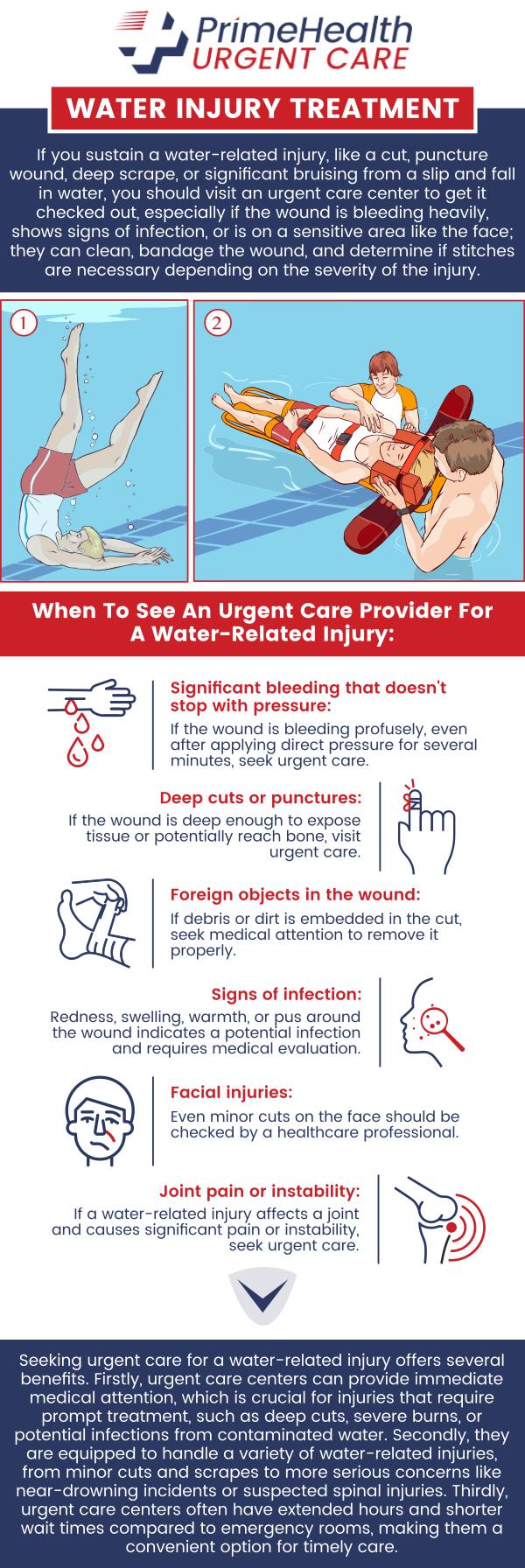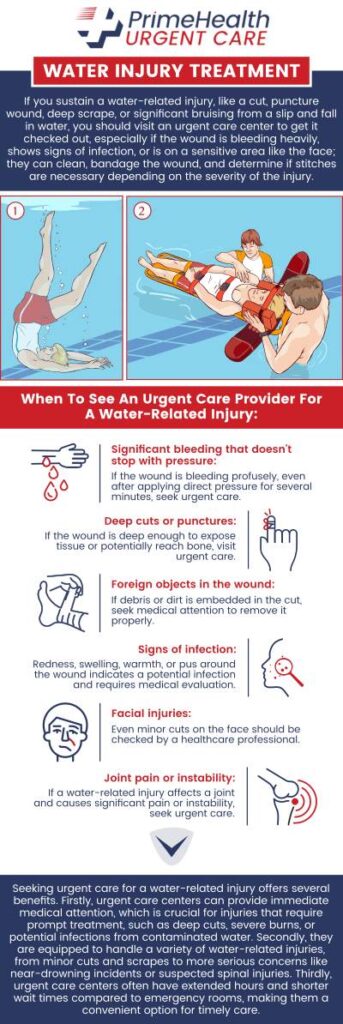Urgent Care for Water Injury Treatment in Sarasota FL
There is a wide range of illnesses that can be contracted from water; however, the elderly, young, pregnant women, and immunocompromised individuals are particularly vulnerable due to the germs that end up in the water from swimmers’ bodies. Dr. Espinel, MD, at PrimeHealth Urgent Care, is experienced in treating water-related injuries. We are conveniently located at 5221 Clark Rd, Sarasota, FL 34233. For more information, please call us or request an appointment online.




Table of Contents:
What is a water injury?
What are some common recreational water illnesses?
Should you go to urgent care for a swimmer’s ear?
What safety measures can you take to prevent injury while swimming?
A water-related injury includes any physical harm stemming from exposure to water, such as while swimming, boating, or participating in water sports. For instance, prolonged contact with cold water can cause hypothermia, a condition where the body loses heat faster than it can produce, leading to dangerously low body temperature.
Near drowning is another water-related injury that occurs when a person is submerged in water and unable to breathe for a while, leading to oxygen deprivation. In addition, traumatic injuries can result from diving into shallow water, getting caught in strong currents, or experiencing a collision during water sports. Contaminated water can also lead to various medical concerns, including gastrointestinal illnesses from ingesting bacteria or parasites and skin infections from contact with polluted water.
Water injuries can range from mild to life-threatening, and prompt medical attention is often required to address the issue and prevent long-term complications. Depending on the severity of your water-related injury, you can visit urgent care or an emergency room to receive treatment.
Some of the most common types of recreational water illnesses (RWIs) include:
• Swimmer’s ear (otitis externa) – This is an infection in the outer ear canal that can result in pain, itching, swelling, and other frustrating symptoms. Swimmer’s ear often occurs when water becomes trapped in the ear, creating an optimal environment for bacteria to grow.
• Cryptosporidium – This waterborne illness leads to watery diarrhea, stomach cramps, nausea, and vomiting. Infection frequently happens when contaminated water is ingested; Cryptosporidium is very resistant to chlorine and can survive in pools for up to ten days.
• Giardia – This parasitic infection leads to diarrhea, gas, stomach pain, nausea, and dehydration. Like Cryptosporidium, Giardia can be spread through swallowing contaminated water and can take a while to be killed by chlorine.
• Norovirus – As it is highly contagious, norovirus can spread quickly through contaminated water in pools, lakes, and oceans. This virus causes a sudden onset of vomiting and diarrhea.
To minimize the risk of these illnesses and other RWIs, such as E. coli and Shigella, you should avoid swallowing water while swimming, shower before and after swimming, and ensure pools and hot tubs are properly maintained.
Yes, if you have an infection in your ear canal, it’s advised that you visit urgent care for treatment. If you experience symptoms such as ear pain, itching, redness, swelling, and sometimes pus drainage from the ear, you likely have a swimmer’s ear.
When you visit urgent care with an ear infection, the healthcare provider will thoroughly examine your ear, confirm the diagnosis, and prescribe treatment to alleviate your discomfort. This typically includes antibiotic ear drops to clear the infection. It’s important to visit urgent care as promptly as possible, as timely treatment reduces the risk of complications.
To prevent injuries while swimming, there are several important safety measures you should keep in mind:
• Be aware of your surroundings – Whether swimming in a pool, lake, or ocean, be mindful of other swimmers, obstacles, and environmental conditions. It’s essential to ensure the water is deep enough before diving, as well as to avoid swimming in hazardous conditions.
• Wear the right gear – It’s recommended to use goggles, swim caps, and earplugs to protect your eyes, hair, and ears. By ensuring your gear fits well and comfortably, you can avoid distractions and potential injuries.
• Listen to your body – If you feel any discomfort, you should stop swimming immediately and allow yourself to rest, as continuing to swim through pain can worsen injuries.
• Stay hydrated and use sunscreen – It’s important to drink plenty of water and apply water-resistant sunscreen (SPF 30 or higher) if swimming outdoors to prevent dehydration, sunburns, and heat stroke.
By following these safety measures, you can enjoy being out in the water while minimizing the risk of injury. If you have sustained a water injury, the dedicated team at PrimeHealth Urgent Care in Sarasota, Florida, can provide comprehensive care. We are conveniently located at 5221 Clark Rd, Sarasota, FL 34233. For more information, please call us or request an appointment online. We serve patients from Sarasota FL, Bradenton FL, Parrish FL, Ellenton FL, Palmetto FL, Lakewood Ranch FL, Sun City FL, Oneco FL, Fruitville FL, and West Samoset FL.

Additional Services You May Need

Additional Services You May Need
• Abscesses
• Sports Injuries
• Bug & Animal Bites
• BV Testing
• COVID Testing
• Drug Testing
• EKG Testing
• Flu Shots
• Foreign Body Removal
• Laceration Repair
• Minor Burn Treatment
• Pelvic Exams
• Strep Testing
• STD Testing
• Fractures, Sprains, & Strains
• Splinting Treatment
• School & Sports Physicals
• TB Testing
• Tetanus Shot
• Urgent Care
• Vaccines
• Wound Care
• Work Injuries
• X-Ray
• Internal Lab Services
• Illness/Injury
• Occupational Medicine
• Employment Physicals
• Common Cold
• Auto Injuries
• Weight Loss
• Wegovy
• Mounjaro
• Telehealth
• Stitches
• Respiratory Infection
• Coastguard Physicals
• Sick Visits





